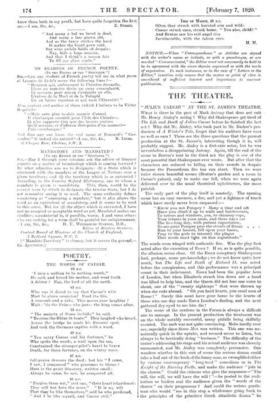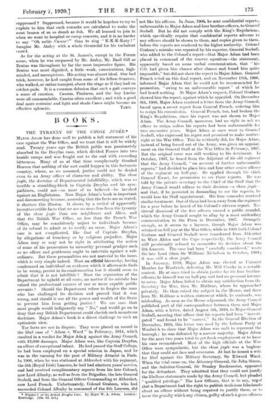THE THEATRE.
" JULIUS CAESAR " AT THE ST. JAMES'S THEATRE.
WHAT is there in the part of Mark Antony that does not suit Mr. Henry Ainley's acting ? Why did Shakespeare get tired of
The Life and Death of Julius Caesar before he finished the last act ? Why did Mr. Ainley, who took part in Mr. Barker's pro- duction of A Winter's Tale, forget that his auditors have eyes
as well as ears ? These are the three questions that the present production at the St. James's, interesting though it is, will probably suggest. Mr. Ainley is a first-rate actor, but he was nevertheless a disappointing Antony. Again, till the end of the scene in Brutus's tent in the third act the play is one of the most powerful that Shakespeare ever wrote. But after that the characters are reduced to falling on their swords in despair because the Promethean fire has run short. Then we were twice shown beautiful scenes (Brutus's garden and a room in Caesar's palace), only to make our fall, when we were again delivered ores to the usual theatrical upholsterers, the more painful.
The early part of the play itself is masterly. The opening scene has an easy sureness, a fire, and yet a lightness of touch which have surely never been surpassed :—
" Knew you not Pompey ? Many a time and oft Have you cimb'd up to walls and battlements, To towers and windows, yea, to chimney-tops, Your infants in your arms, and there have sat The live-long day, with patient expectation, To see great Pompey pass the streets of Rome. • • Run to your houses, fall upon your knees, Pray to the gods to intermit the plague That needs must light on this ingratitude."
The words seem winged with authentic fire. Was the play first
acted after the execution of Essex ? If so, as is quite possible, the allusion seems clear. Of the Essex conspiracy Shakespeare had, perhaps, some pre-knowledge ; we do not know quite how
much, but The Life and Death of Richard II. was acted before the conspirators, and this performance was a principal
count in their indictment. Essex had been the popular hero of London, but when Elizabeth struck him down not a hand was lifted to help him, and the Queen did not lose one voice to shout, one of the " sweaty nightcaps " that were thrown up when she rode abroad. " Oh you hard hearts, you cruel men of Rome ! " Surely this must have gone home to the hearts of those who one day made Essex London's darling, and the next gathered 'dry-eyed to see him die !
The scene of the orations in the Forum is always a difficult one to manage. In the present production the treatment was on the whole notably successful, many pitfalls being skilfully avoided. The mob was not quite convincing. Mobs hardly ever
are, especially since Seven Men was written. This one was un- naturally quick in the uptake, and seemed never to listen, but always to be hectically doing " business." The difficulty of the orator's addressing his stage and his actual audience was cleverly surmounted, and Mr. Ainley was completely persuasive. One wonders whether in this sort of scene the serious drama could take a leaf out of the book of the funny man, as exemplified either by various contemporary " long-toed " comedians or in The Knight of the Burning Pestle, and make the audience " join in the chorus." Could the citizens who give the responses--'The' will, the will, we will have the will ! "—be posted in the audi- torium as leaders and the audience given the " words of the chorus " on their programme ? And-could the serious gentle- man who would " see in this step a, wholesome going back to the principles of the primitive Greek ritualistic drama " be,
suppressed ? Suppressed, because it would be hopeless to try to explain to him that such remarks are calculated to make the most brazen of us as dumb as fish. We all learned to join in when we went to hospital or camp concerts, and it is no harder to say " Oh noble _Caesar !" than to sing " K-K-K-Katy ! " Imagine Mr. Ainley with a whole theatreful for his turbulent crowd.
As for the acting at the St. James's, except in the Forum scene, when he was surpassed by Mr. Ainley, Mr. Basil Gill as Brutus was throughout by far the most impressive figure. His Brutus was most dignified, a little weak, conscientious, high- minded, and unsuspicious. His acting was almost ideal. One bad trick, however, he had caught from some of his fellow-Senators, who walked, or rather tramped, about the stage as if they had on cricket-pads. It is a common delusion that such a gait conveys a sense of emotion. Cassius, Pindarus, and the boy Lucius were all commendable, Cassius often excellent ; and with a good deal more restraint and light and shade Cases might become an







































 Previous page
Previous page